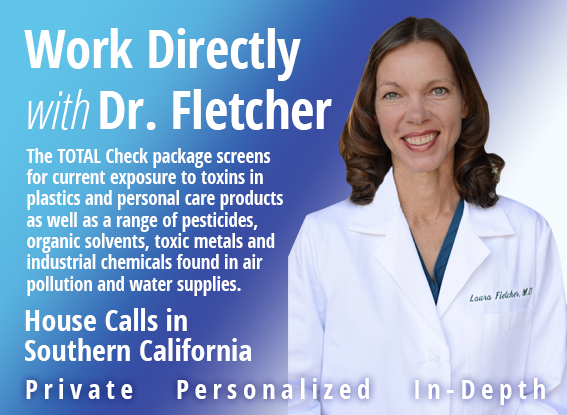
Every day we eat, drink, breathe, and absorb environmental toxins that can interfere with hormone balance and damage both egg and sperm quality. Chemicals found in plastics and personal care products, heavy metals such as cadmium and mercury, and a range of pesticides and industrial chemicals can have a big impact on fertility, even in small amounts.
Through the proven Detective Medicine™ system used by Dr. Fletcher, you will discover where toxins are hiding in your environment– where you live, work, and travel– and test for which toxins are getting into your body. Why does this matter? Environmental toxins are a reversible cause of infertility! This could be the missing piece in your fertility journey.
Call 760-206-4110 for a free 20-minute phone consultation with the doctor to see if this could work for you.
There are 30 years of scientific research linking the effects of various chemicals and metals to hormone disruption and poor reproductive outcomes. ToxCheck™ is the only service of its kind in Southern California taking direct action based on this research and applying it to medical practice– helping YOU find out specifically which chemicals and metals may be impacting your fertility.
You will receive personalized guidance on how to remove sources of exposure and decrease the toxic load on your body to improve the health of both you and your family-to-be. With time and dedication, clients have been able to reverse their fertility challenges by removing toxic exposures discovered through the in-depth Detective Medicine™ system.

Dr. Fletcher was educated at Stanford University and Baylor College of Medicine. She has been practicing medicine for 20 years with a specific focus on environmental toxins– how they contribute to infertility and disease– for the past 10 years. Dr. Fletcher has developed a rare expertise in a complex field with the unique ability to make connections between specific chemical and metal toxins and their likely sources of exposure based on a client’s daily habits, environment, and life history.
What are environmental toxins and how do they affect fertility?
Environmental toxins are chemicals and metals with which you come into contact during daily life (small repeated exposures) that can cause direct damage to your reproductive system and can build up in your body and damage egg and sperm quality. Here are a few examples of personal care and plastic-related chemicals that can act like reproductive hormones and cause dysfunction:
- Bisphenol A is linked to lower follicle counts and decreased sperm count and motility
- Phthalates are linked to decreased sperm motility and lower testosterone levels in men
- Increasing paraben levels correlate with lower follicle counts and diminished ovarian reserve
Even the top reproductive organizations agree that this is a problem we must begin to address: “The evidence that links exposure to toxic environmental agents and adverse reproductive and developmental health outcomes is sufficiently robust, and the American College of Obstetricians and Gynecologists and the American Society for Reproductive Medicine join leading scientists and other clinical practitioners in calling for timely action to identify and reduce exposure to toxic environmental agents while addressing the consequences of such exposure.” Fertility and Sterility, October 2013
